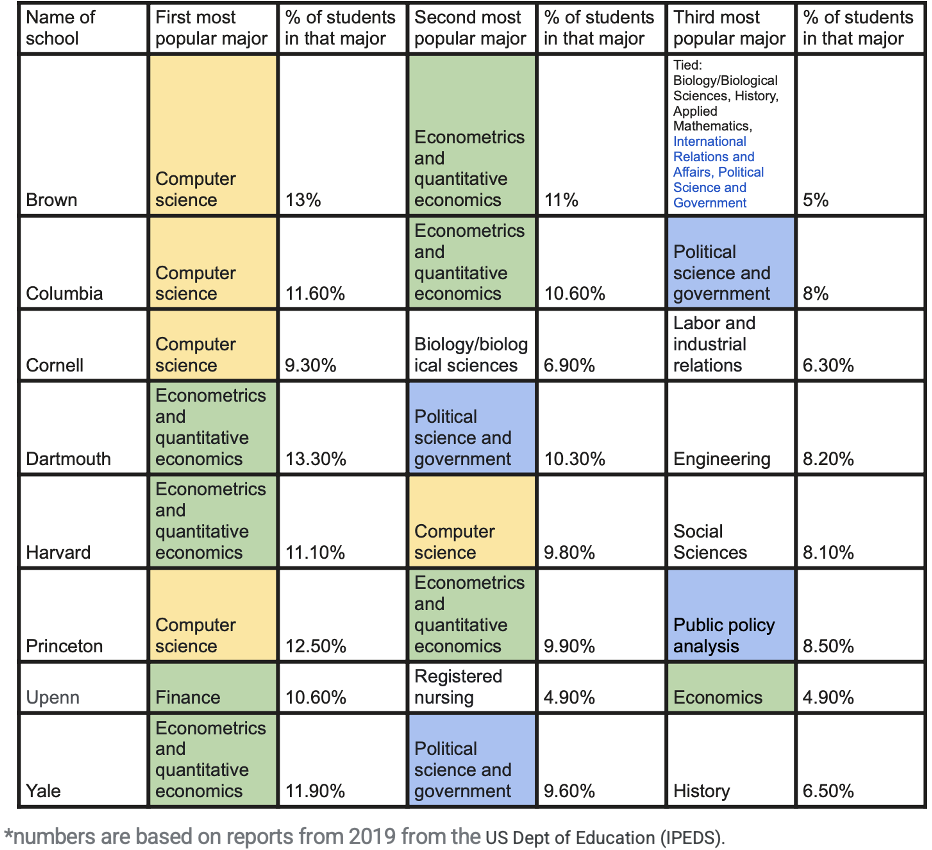What is the most popular major in the Ivy League? It’s hard to say exactly. Since there are 8 schools, not every school will have the same breakdown when it comes to popular majors. However, two majors have made the list of Most Popular Majors at almost every Ivy League School: Computer Science and Econ.
The US Department of Education releases information yearly about college majors. Their most recent report from 2019 (they are usually a couple of years behind) shows an interesting trend in the Ivy League.
So let’s talk about what this all means.
The first thing you probably noticed is that computer science and economics are incredibly popular. This is obvious if you look at the labor market—students want high paying jobs so they are choosing majors that translate into those jobs. Computer science and econ are great majors to get into. But they are highly highly competitive to get into.
You also have probably noticed that there is a wacky name or two in here. You probably haven’t heard of “Econometrics and quantitative economics.” That’s partially because it isn’t really the name of the major at most schools. The DOE changes the names of majors and even sometimes will lump majors together to standardize their data. So if one school offers an “Economics” major and a “Comparative Economics” major and a different school offers an “Economics and Mathematics” major, the DOE doesn’t always see those as different enough to report as multiple majors with different names. We think this is actually a pretty useful practice for this type of exercise, just don’t be shocked if you google “Princeton Public Policy Analysis Major” and get “the Undergraduate Policy Major at Princeton.”
Maybe you noticed is each top major hovers around 10%- 13%. That might not sound very high. In some ways, it’s not. But remember that some of these schools have almost 100 majors. No one major will have anywhere close to 50% at a school like this. Princeton is on the low end of majors for the league with around 37 majors. This is why their second and third percentages are far higher than those of UPenn which has close to 100 majors. It’s not the most important aspect of this data, but if the numbers seem odd to you, that’s why.
There are also a couple of outliers in this data. The biggest outlier is UPenn. If you look at the data, while there are some unique majors in the second and third spots, UPenn is the only school that doesn’t have Computer Science or Econ in its top spot. That mainly has to do with Wharton. Many Ivy League schools don’t have undergraduate business and nursing schools. Penn does, which shakes up their percentages pretty obviously. Out of the 8 Ivies, only Penn, Columbia, and Cornell have business schools. For reference Wharton has about 5,000 students while Cornell’s two business schools have about 1,500 undergrads, meaning Wharton is also a lot bigger. Interestingly enough, one of Cornell’s business schools is a hotel management program and while we didn’t include the 4th most popular major in our chart, Cornell’s is Hotel/motel administration/management with about 5.6%. This is because everyone at that school is in that major. UPenn also has the only undergrad nursing school in the league. Meaning it makes sense for Nursing to be on their list for UPenn, but not on any of the other schools.
Going by just the top 3 majors, Econ, Computer Science, History, and Political Science are the most popular majors across the Ivy League. Some other popular majors in the Ivies include Biology which ranks highly in the top ten majors at Cornell, Princeton, Harvard, and others. Mathematics also usually ekes into the top ten at most Ivies. Past these top 6, it gets harder to say definitively what the most popular majors are. Mainly because at many schools after the top 3 or four majors we are talking about sub 5% of students.
You might be asking yourself, however, “what if I want to go to an Ivy League but not for any of these majors?” That’s fine! There is nothing wrong with being in a small department or a specialty major. Many Ivies have unique majors. Harvard is probably the only Ivy with a Folklore and Mythology Major. If you want Ivy League Criminology it’s only at UPenn. The History and the Practice of Diplomacy major is related to many fields but specifically unique to Princeton. These specialized majors are small and unique, but that can be a really powerful thing. Just because something is popular doesn’t mean you need to do it. However popular majors can have great resources at top schools, so these popular majors can also be a great fit for the right student.
Need help figuring out which Ivy is best for you? Need help getting in? It’s what we do! Reach out here.
